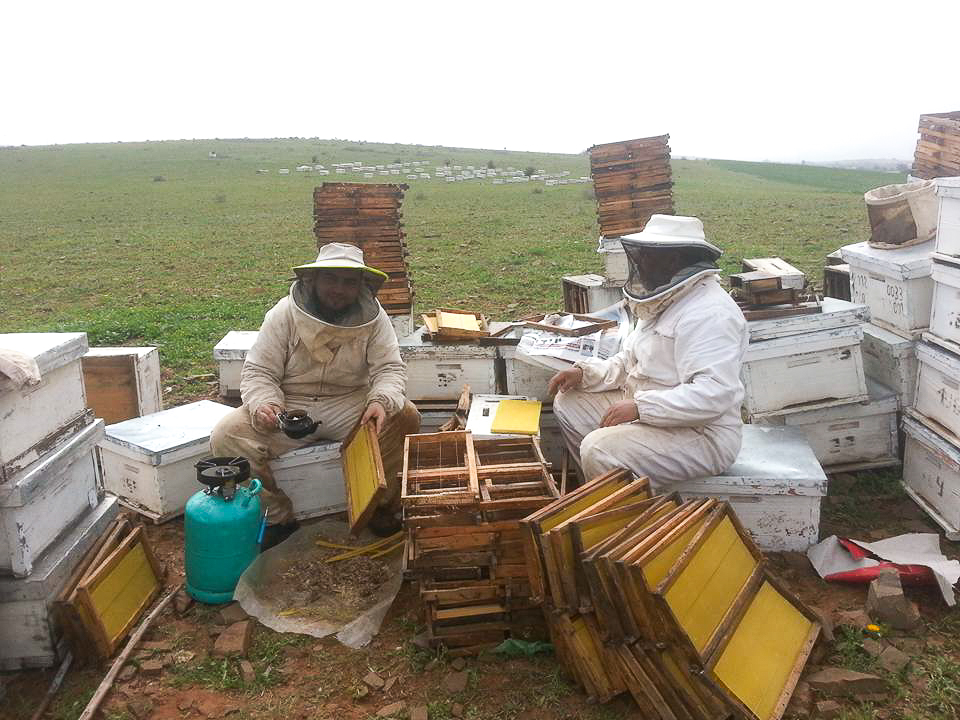Thanks to its outstanding capacity of adapting to extreme temperatures – both high and low – the Saharian bee (Apis mellifera sahariensis) offers a high level of resilience to climate change impacts. In Tizi Ntakoucht, a small commune in the region of Souss-Massa of Morocco, Union APINECTARDEV – an association of cooperatives dedicated to beekeeping – are working to reduce the mortality of this endemic sub-species while contributing to the development of a sustainable economic activity in the region.
“My bees started weaving wax tablets and producing honey. I kept them for several years and [since then], these have grown into several other colonies that also produced honey. This allowed me to earn money and increasing my income while looking after the bees » explains Said, a beekeeper member of Union APINECTARDEV. He is part of the communities whose activity depends on the yellow bee.
In this region of southwest Morocco, threatened by desertification and biodiversity loss, local populations are trying to create jobs and stop the migration to bigger cities.
« However, through direct contact with the bees, I learned that their value goes beyond any economic asset: when I cultivate my field and the plants bloom, I can see the bees taking care of them, while they produce honey from their pollen. One day I was about to sell one of the cells to a friend but I then I decided to keep it.” Little by little, Said developed a passion for looking after his bees, which encouraged him to educate his community on best practices for sustainable beekeeping, as a part of Union APINECTARDEV.
Created in 2016, the association aims to safeguard the Saharian bee, conserve both biodiversity and natural resources, while contributing to improve the standard of living of the local population.
However, several diseases are threatening the survival of Saharan bees affect the livelihood of this 60-year-old beekeeper’s, as for example:
- The presence of varroa mites, which parasitize bees to the point of causing colony collapse syndrome,
- The presence of invasive species.
By offering training courses, the APINECTARDEV Union teaches the good methods of conservation of the species to its members, in order to stop the threat of extinction and preserve the bees:
- The division
This procedure is the simplest and most widely used by beekeepers. It consists of the creation of a new colony by dividing the larvae or eggs of a given hive. The risk here is at the time of fertilization. An accident of the queen during her nuptial flight or bad weather will prevent her and the males from going out for a long time and the division will fail. The queen will then lay sterile eggs.
- The use of royal cells
This practice takes advantage of the natural reproduction methods of bees by using the royal cells of a hive which is about to swarm or has already swarmed.
- The breeding of queens
This process involves the breeding of queens from its own colonies, which allows to choose the most suitable genetics, based on the acceptance rates- It must be done with great care: the queen and the colony must be carefully prepared and a very precise process must be followed.
- Nomadism
During fertilization, nomadism and transhumance avoid bee transfer to other western regions in the absence of a suitable route in their geographical area. It therefore helps to avoid the mixture of races, which affects the extinction of the local species. In addition, a mixture of races can also be a danger for the new emerging species.
- Artificial swarming
Swarming is a natural process in the life of the bee, which often takes place in late spring and early summer. This episode, although natural, can cause the death of several bees if they cannot find a place to form a hive quickly. In order to maintain a low population in the swarm and multiply their colonies, beekeepers use artificial swarming to improve the genetics of the species by breeding selected queens from bees taken from the original hive.
The association explains this process:
“This method allows to prepare an extension programme on a farm. It opens the way to modern methods of beekeeping, queen breeding and selection. One of the methods used to halt the decline of local bees is to clone them in a modern way. We rely on the breeding of local queens in their geographical context to avoid the fertilization of virgin queens by foreign males. «
These sustainable beekeeping practices help both to conserve the local biodiversity and the economic activities of the populations in the region of Tizi Ntakoucht.
“The partnership with IUCN in the framework of the PPI-OSCAN II is an opportunity for our union of cooperatives to consolidate this local dynamic we launched since 2016. Offering these trainings to men and women, acquiring the necessary equipment to increase bee colonies in a sustainable way helps us to avoid the decline of our local heritage, the genetic diversity of bees and our local ecotypes. «
The project aims to create employment in the region and ensure a future for entire communities, following the Moroccan government’s goal to produce 16,000 tones of honey in 2020.
The cooperative’s project inside of PPI-OSCAN 2 started in 2019 and will end in 2021. Eleven Moroccan associations participate in this program implemented by IUCN-Med and jointly funded by the French Facility for Global Environment (FFEM) and MAVA Foundation.







